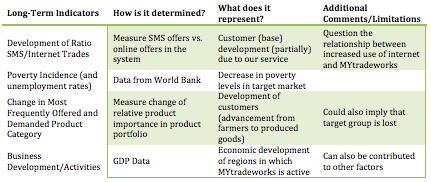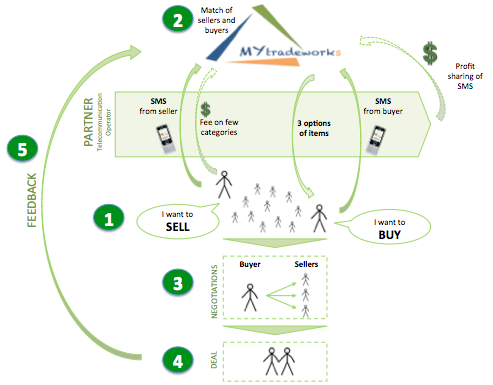MYTRADEWORKS
- d/ Affordable and Clean Energy
- d/ Clean Water and Sanitation
- d/ Climate Action
- d/ Decent Work and Economic Growth
- d/ Gender Equality
- d/ Good Health and Well-being
- d/ Industry, Innovation and Infrastructure
- d/ Life Below Water
- d/ Life on Land
- d/ No Poverty
- d/ Partnerships to achieve the Goal
- d/ Peace, Justice and Strong Institutions
- d/ Quality Education
- d/ Reduced Inequality
- d/ Responsible Consumption and Production
- d/ Sustainable Cities and Communities
- d/ Zero Hunger
Category:
Trade and Market Access
Theme:
Creating jobs at the Bottom of the Pyramid.
Deck:
Decent work and economic growth; Life on land;
Event:
Global Social Business Competition 2013
Rank:
Winner
Team:
Gabrielle Snijder, Manuela Hug, Estee Hak, Nadege Ruzicka
Status:
Idea

Out of the 7 billion people on our planet, 1.4 billion still live in extreme poverty, meaning they have to survive on less than US$1.25 a day. Worldwide, 70% of those extreme poor live in rural areas (World Bank, 2012) – most of them in developing countries. Given the forecasts of a 50% increase in the population by 2050 (IFAD, 2011), of which the majority will be in developing countries, the fight against rural poverty can no longer be postponed. Poverty in rural areas has several causes. One of the most prevalent causes is the lack of infrastructure. Without proper transport and access to information systems like the Internet, markets cannot work well and thus business opportunities and subsequent jobs at the bottom of the pyramid are limited.
Imagine a farmer producing a good that he (or she) would like to sell. Due to the large distance to the market he not only has to solve the challenge of transportation but he also does not know if he can find a buyer or what price he can ask for his goods. To overcome his problem, he relies on a “middleman” who buys the goods from the farmer and resells it with a profit margin. This significantly reduces the potential profit for the farmer and also makes him dependent on the middleman. In a nutshell, the basic mechanism of efficient markets – the free exchange of goods and services – cannot work efficiently in rural areas as most of the people neither have direct market access nor transparent information. Without these efficient market structures, people are not only unable to fulfil their basic needs but also have no incentives to produce more if they believe they will not sell it. Under these conditions, businesses cannot advance and subsequent job creation is hindered. Without economic development, investments in improving infrastructure and living standards cannot be realized. Hence, finding a solution to improve this market situation is key in order to fight rural poverty and improve future perspectives for its people.
When examining the competitive environment in which MYtradeworks will operate, we can identify direct (similar target market, similar solution), potential (different target market) and indirect competitors (substitutes). As MYtradeworks will enter a new market, very few direct competitors exist and therefore potential and indirect competitors are of higher relevance. We have combined the direct and potential competitors in our analysis to find the following firms:
M-Farm is a mobile and web start-up which uses a basic SMS-interface to help farmers by providing access to current market prices, aggregating their needs to get favourable prices from suppliers, and giving them direct, collective access to both regional and export markets for their products. (kimoquaintance.com, 2013)
CellBazaar is a mobile-based electronic marketplace in Bangladesh. The service allows individuals to buy and sell any type of goods (mainly electronics) in his region in a simple way using mobile phone or Internet. The company targets high-end BoP customers. (cellbazaar.com, 2013)
eBay is the largest online (US-based) marketplace with an enormous global reach. A community of private customers -and some small companies- can access the service via any connected electronic device to buy and sell anything they like. (ebay.com, 2013)
Of these competitors, only M-Farm is active in the Kenyan market. Nevertheless, all competitors have strengths and weaknesses in their similarities and differences with MYtradeworks. The following table provides an overview of these differences and consequently the degree to which the competitors form a challenge for MYtradeworks.

MYtradeworks provides direct market access to poor individuals in remote, rural areas. It establishes direct contact between potential buyers and sellers, which reduces transaction costs, as less time and money, is wasted to search for potential trading partners. In this manner, any travels to the marketplace become more effective as chances for successful trades are higher. Furthermore, MYtradeworks eliminates the middleman’s profit margin, therewith increasing the sellers’ profits and lowering the buyers’ prices.
MYtradeworks is significantly different from other players in the market as it connects people at the BoP in rural areas to empower them to trade independently and provides them with market information. Individual producers are addressed, not only large bulk producers. It is therefore possible for individuals to trade on a small scale and for personal use only. Furthermore, in line with the concept of network externalities, the larger the user mass grows, the more beneficial MYtradeworks becomes for the individual user as market transparency increases. In addition, MYtradeworks contributes to the development of a network of traders in specific regions, which strengthens the community feeling. Being part of a strong network of people in similar situations and experiencing many different business activities in one’s environment can contribute to a more positive future outlook of individuals.


